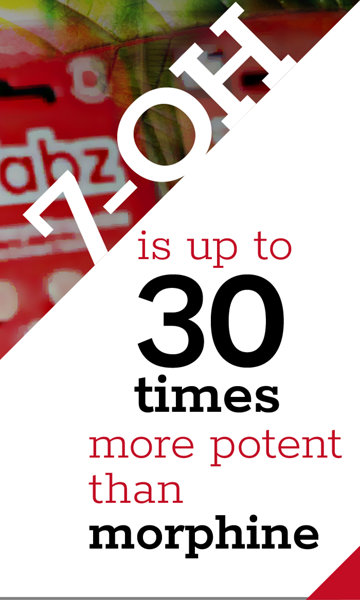Nor can you pop into your neighborhood vape shop and grab a packet of heroin or a fistful of opioids.
But you can buy “7-OH,” or 7-hydroxymitragynine, a substance experts are calling “legal morphine,” with no problem at all.
That’s because, in most states, it is completely legal.
And completely lethal.
“These companies are making this stuff in a big bathtub somewhere.”
Packaged in colorful wrapping, with catchy names like “Rave” or “O’Heaven” and flavors like “citrus splash” or “sweet grape,” 7-OH products can be as addictive and life-destroying as illegal opioids—and you can buy them in a gas station.
“I am extremely concerned about these semi-synthetic products and I believe they could take society in another opioid pandemic direction,” University of Florida kratom researcher Abhisheak Sharma said.
Unlike natural kratom, an herbal extract from a Southeast Asian tree containing a small amount of 7-hydroxymitragynine, these synthetic products deliver a concentrated, often dangerously amplified dose.

Even pro-kratom industry sources like Matthew Lowe, executive director of the Global Kratom Coalition, warned: “Distinguishing synthetic 7-OH isolates from kratom leaf and kratom extracts is critical to consumer safety. I would, however, add that these concentrated synthetic 7-OH products are not dietary supplements either. They contain novel chemicals that are not found in nature and have not been consumed by humans before. These products are unapproved new drugs.”
The difference between herbal kratom and synthetic kratom can be extreme. “When you use a concentrated extract, you’re getting a lot more material all at once,” said Christopher McCurdy, a kratom researcher at the University of Florida, who compared the difference between the plant extract and 7-OH to “drinking a Miller Lite versus drinking 12 ounces of Everclear.”
“These products have shown addiction already in many people,” he said. “Some individuals are taking 10 times, even 15 times, the labeled dosage. What they have created is an isolated, chemical entity that we know is a pure opioid.”
“These companies are making this stuff in a big bathtub somewhere,” said Dr. Kirsten Smith of Johns Hopkins University School of Medicine. “There is a lack of standardization. From batch to batch, you could have one that is not very potent and another that is super potent.”
Florida Senator Jay Collins, who has attempted to regulate the sale of the drug, saw his bill fail in committee. The drug is “incredibly and inherently dangerous to our community,” he said. “We’ve got to get ahead of this.”
Professor Paula Brown of the British Columbia Institute of Technology warned: “Synthetic 7-OH is not kratom. It is a highly potent, unregulated chemical. Consumers have a right to transparency, yet these products are often mislabeled and marketed deceptively as natural extracts. Without proper quality and safety testing, they carry a significant risk of causing harm.”
“The quote I hear over and over again is, ‘I can’t believe this is legal.’”
Social media is full of people complaining about what 7-OH has done to their lives.
“I, too, have had an intense addiction to 7-OH tablets,” one young woman wrote. “They drained my bank account, ended up spending each paycheck on them and hid my use from my family and friends. The chokehold these little (expensive and legal) tablets that had on me!!! I wanted to quit so bad, but the withdrawals were something out of hell itself—the sweating while freezing cold with goose bumps and drops of sweat at the same time, the body aches like someone hit you with a baseball bat all over, the insomnia with intense jerk-like restless legs syndrome…. Wouldn’t wish it on my worst enemy.”
The Scientific Association for Botanical Education and Research even warned: “Synthetic 7-OH is up to 30 times more potent than morphine at opioid receptors, significantly increasing the risk of dependence and overdose.”
“Due to the lack of clinical safety data, synthetic 7-OH products pose severe risks, including respiratory depression, toxicity and addiction.”
Dr. Christine Bell from Sacramento’s Core Clinic termed 7-OH “gas station heroin.”
Six states, including Alabama, Arkansas, Indiana, Rhode Island, Vermont and Wisconsin, ban the active ingredients in kratom, while 16 have put some regulatory controls on the substance—including on the potency that can be sold—and block its sale to minors.
And yet, both herbal and synthetic, it’s still legal and readily available pretty much everywhere else.
Louisiana is considering a ban on kratom. Dr. Pete Croughan, deputy secretary of the Louisiana Department of Public Health, said he sees “more patients with kratom addiction than with crack addiction.
“The quote I hear over and over again is, ‘I can’t believe this is legal,’” Croughan said.
Neither can we.






















